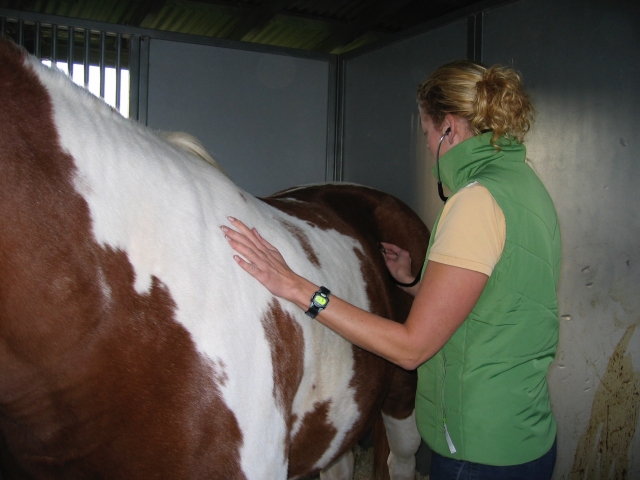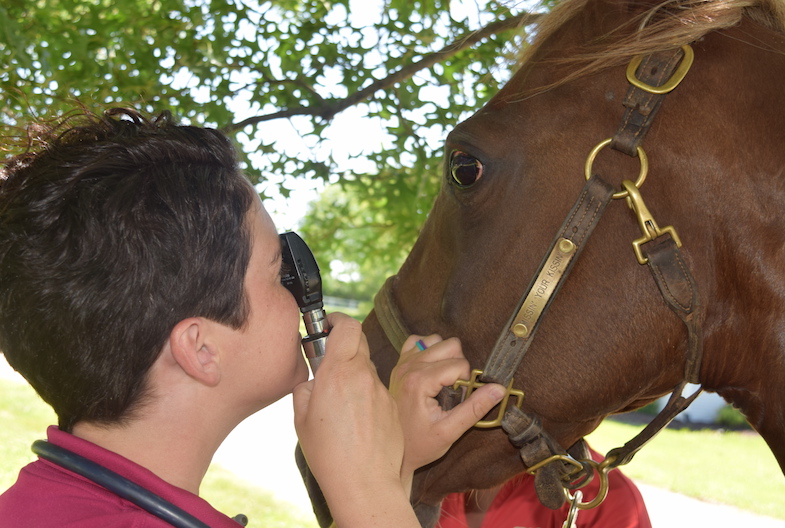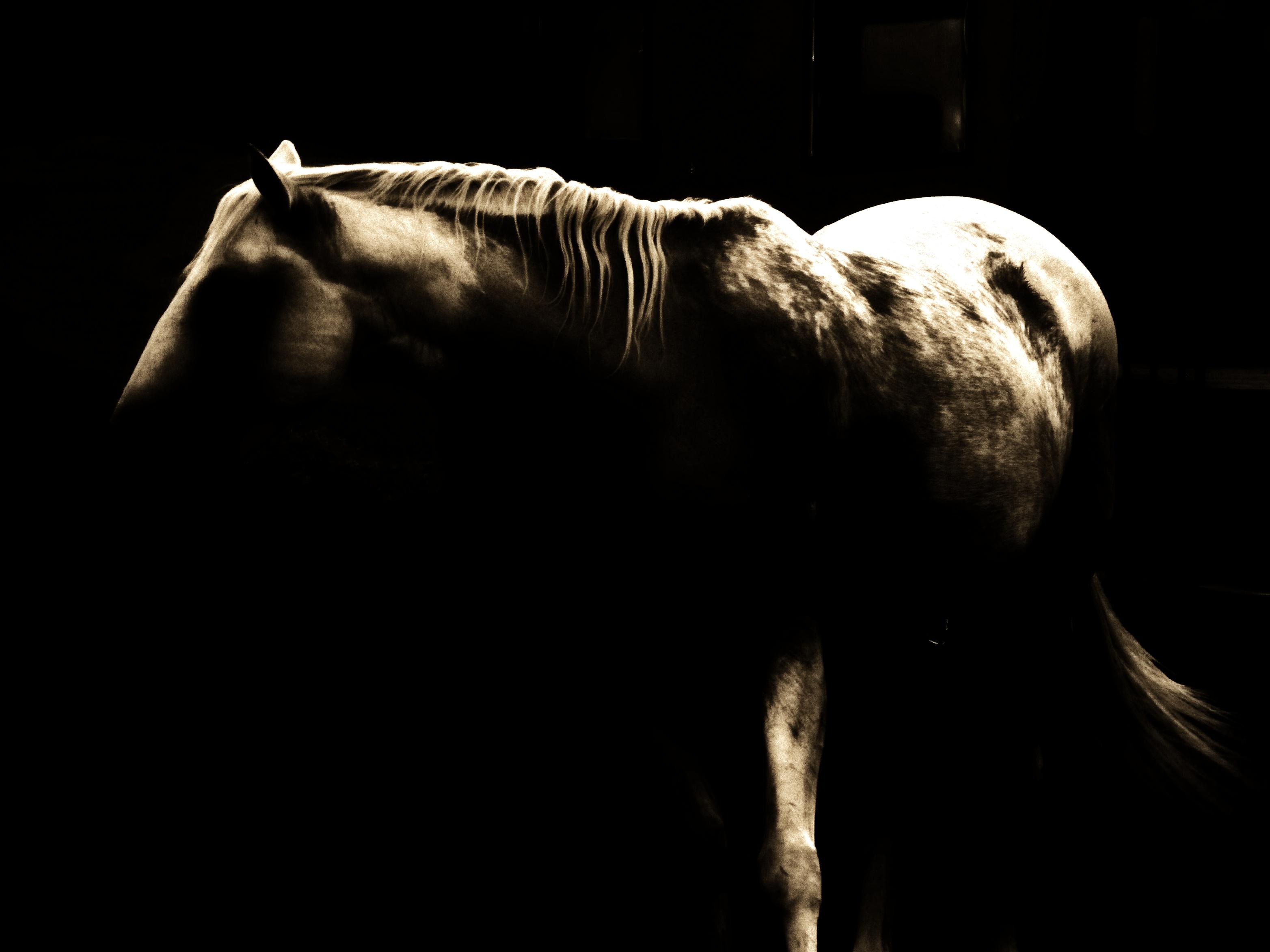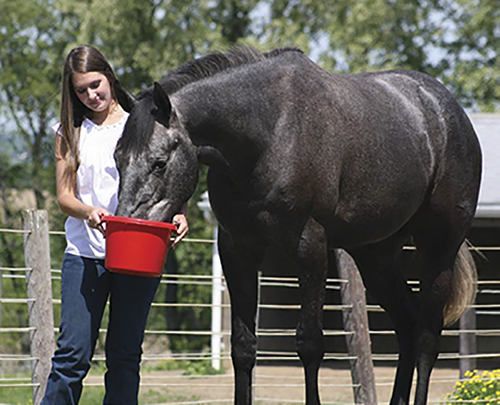- Details
- Written by: Heather Thomas
- Category: Health
 A physical exam is still one of the veterinarian’s best methods of diagnosing colic. // Photo by Nora Grenager.
A physical exam is still one of the veterinarian’s best methods of diagnosing colic. // Photo by Nora Grenager.
Equestrians dread few things like they dread a colicky horse, and for good reason.
Colic, of course, simply means abdominal pain in the horse, and it can stem from a wide range of causes, including an impaction, gas colic, a twisted gut or some other rare problem. In addition to the danger it poses to the horse, it’s also a frustration for horse owners that, despite a wide array of modern technology, vets can’t just look inside the horse to determine the problem. Colic is still a puzzle, and the only way to know with 100 percent certainty what’s going on is to open the horse up surgically. Because of these limitations, there are two very important things to remember when dealing with colic: trust your vet’s detective skills, and don’t let your desire for full and perfect knowledge prevent you from acting quickly on the knowledge you do have.
- Details
- Written by: Patricia Bailey, DVM
- Category: Health
 Finding your next equine partner conjures a mix of excitement and trepidation. You and your equine partner need to have the perfect chemistry. Finding the perfect partner is deeply personal, and the purchase of any horse should never be entered into lightly. Pre-purchase veterinary examinations can give you a better idea of the condition of the animal you are considering. You would never purchase a home without a thorough inspection; protecting your investment is of the utmost importance. The same can be said for purchasing your next equine partner. But what is involved in an in-depth pre-purchase exam?
Finding your next equine partner conjures a mix of excitement and trepidation. You and your equine partner need to have the perfect chemistry. Finding the perfect partner is deeply personal, and the purchase of any horse should never be entered into lightly. Pre-purchase veterinary examinations can give you a better idea of the condition of the animal you are considering. You would never purchase a home without a thorough inspection; protecting your investment is of the utmost importance. The same can be said for purchasing your next equine partner. But what is involved in an in-depth pre-purchase exam?
- Details
- Written by: Allie Layos
- Category: Health

Spring in the Saddlebred world usually means a few practice shows under everyone’s belt, with riders and trainers anticipating the larger shows of the mid and late summer. This year, however, with the entry of equine herpesvirus myeloencephalopathy (EHM) into the Saddlebred community, show season has taken a different turn.
EHM is a form of equine herpesvirus 1 (EHV-1) that is characterized by neurological disease. Both the mutated and non-mutated form of EHV-1 can cause EHM, but the mutated form is generally believed to do so more often, and has seen an alarming increase in recent years. In just a few short weeks it has terrified owners, cancelled horse shows, and brought about the death of a handful of excellent and beloved horses; it is a potentially deadly disease with no real vaccine and no real cure. However, as scary as EHM may be, there are precautions that can be taken to minimize your horse’s risk of infection, and a better understanding of the disease may go a long way in keeping show horses safe.
- Details
- Category: Health
 Some horses are fussy eaters and it can be difficult to find ways to get them to eat enough food. Some individuals don’t eat enough if they are confined (rather than out on pasture) and it’s hard to keep weight on them. This is a common and often challenging problem, especially in hard-working performance horses that need a high level of nutrition, according to Bill Vandergrift, PhD (an equine nutritionist who works with several feed companies, including Triple Crown).
Some horses are fussy eaters and it can be difficult to find ways to get them to eat enough food. Some individuals don’t eat enough if they are confined (rather than out on pasture) and it’s hard to keep weight on them. This is a common and often challenging problem, especially in hard-working performance horses that need a high level of nutrition, according to Bill Vandergrift, PhD (an equine nutritionist who works with several feed companies, including Triple Crown).
“In my experience—looking at palatability of feeds and why horses become finiky—there is usually some reason. Usually the horse is already on a good diet and historically has been eating well, and then all of a sudden is not eating as much or doesn’t want to eat a new feed, especially if the owner, manager or trainer decides to add an additional supplement to the feed. The horse may be taking longer to eat or not cleaning up the feed,” he says.
“Any time we run into this problem, the first thing that we think of is some type of GI tract inflammation. This could include gastric ulcers, hindgut ulcers/inflammation,or small intestine inflammation. All three of these situations need to be treated a bit differently.”
So when a horse goes off feed or eats less enthusiastically, a person needs to find out if there’s a physical reason, and what it might be.



